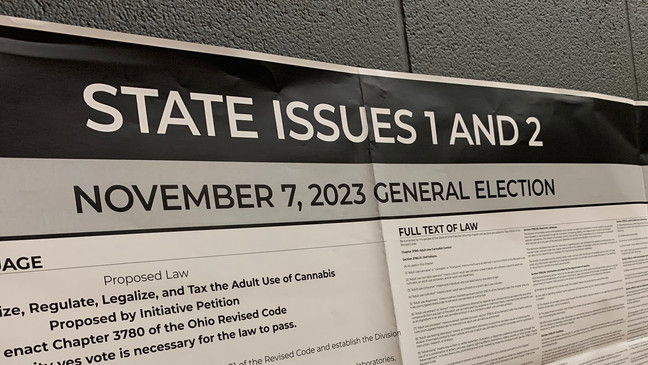Last November, Ohio citizens voted by 57.19% to pass the Marijuana Legalization Initiative (2023) during a statewide ballot referendum. Under this new “indirect initiated state statute,” the substance can be sold and purchased to individuals 21 and older. With the legalization of cannabis possession for those old enough, students may wonder if John Carroll University’s policy will adjust to accommodate the new law.
According to a 2021 study, marijuana “is by far the most used illicit substance, with an estimated over 40 million Americans reporting use during their lifetime.” This is no different for college students as the Michigan Psychological Association says that “between 43% and 44% of college students report any cannabis use in the past year.” This naturally varies by institution depending on the school’s policies and location; schools who saw higher usage rates were typically situated in states that legalized recreational marijuana.
However, just because Ohio has now joined the 23 other states who have given weed the greenlight, it does not mean students can expect things to change at John Carroll. According to the interim Dean of Student Dr. Lisa Brown Cornelius, the university’s policies remain intact as JCU is subject to the federally engrossing Drug Free Schools and Communities Acts Amendments.
“Federal law prohibits the use of medical and recreational marijuana at any age and in any form, including but not limited to smoking, tinctures, topicals, edibles and oils,” John Carroll’s Community Standards Manual reads. “Federal law remains in place despite Ohio state law, which permits medical and recreational marijuana in circumstances outlined in Ohio’s laws. Because of the University’s obligations to comply with the Drug Free Schools and Communities Act as a recipient of federal funds, John Carroll University must observe and comply with federal law that requires the University to prohibit any use of marijuana, even if permitted by state laws on use of medical or recreational marijuana.”
As said by Dr. Elizabeth Stiles, the pre-law adviser at John Carroll, this legislation enacted in the 1980s “did not distinguish between marijuana and other drugs not produced by the pharmaceutical companies. It forces universities to prohibit drugs to retain federal funding.” This means that a lack of enforcement could curb John Carroll’s federal funding. Stiles also highlights that a subsection of the bill requires institutions have “a clear statement that the institution will impose sanctions on students and employees (consistent with local. State and Federal law), and a description of those sanctions, up to and including expulsion or termination of employment and referral for prosecution, for violations of the standards of conduct.”
“So until the federal government catches up with the many state governments that are changing their policies around the beneficial aspects of marijuana and in light of the fact that 85% of adults support the legalization of marijuana, students at JCU and other universities will officially have to do without the benefits of cannabis,” Stiles said.
This means that all of the past procedures are still in play and the student conduct process has not changed for marijuana related policy violations. Chief Jeffrey Daberko also affirmed to The Carroll News that, regardless of the state statute, JCU PD will respond to weed incidents the same as it has before. Despite the stagnant policy, Brown Cornelius highlights John Carroll’s wellness team who has done “a great job of adapting trainings and programming in response to the needs of our students.”
“Educating students about the effects of marijuana and other substances has always been an area of focus and will continue to be one,” she stated. “Key to this education, however, is helping students reflect on the decisions they make about the use of marjuana and other substances and how these decisions may impact their personal and academic lives. This important work continues.”
Whether the federal government will play catch up as Stiles suggests is subject to the times. But for now, John Carroll University’s rules on marijuana are here to stay.




